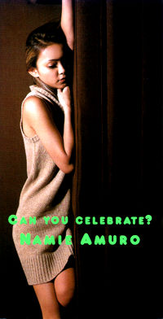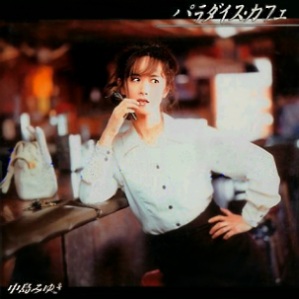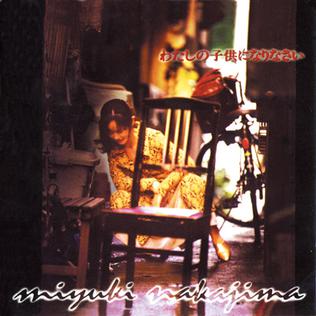Chitose Hajime is a Japanese singer from Amami Ōshima. She sings in the shima-uta style particular to that region, with distinctive falsetto effects.

Bachelor No. 2 or, the Last Remains of the Dodo is the third studio album by American singer-songwriter Aimee Mann, released on May 2, 2000. The album is notable for the fact that Mann was initially without a record company and sold the album through her website, but the album went on to gain a worldwide release and achieve respectable sales. This was aided by the success of the Magnolia soundtrack, for the film of the same name by Paul Thomas Anderson, with which the album shares material.

Rainbow 7 (レインボー7) is the seventh album by the J-pop idol group Morning Musume. It is the first album to feature 7th generation member Koharu Kusumi and first album after graduation of Kaori Iida and Rika Ishikawa and departure of Mari Yaguchi. It was released on February 15, 2006.

"Can You Celebrate?" is Namie Amuro's seventh solo single under the Avex Trax label. Released on February 19, 1997, "Can You Celebrate" is the best-selling single by a solo female artist in Japanese music history, with sales of 2,296,200 copies.

Paradise Cafe " is the 23rd studio album by Japanese singer-songwriter Miyuki Nakajima, released in October 1996. The album includes a new recording of her 1995 chart-topping hit "Wanderer's Song", and also features her own interpretation of "Lie to Me Eternally", which was originally written for the Long Time No See album recorded by Takuro Yoshida.

10 Wings is the album by Japanese singer-songwriter Miyuki Nakajima, released in October 1995.

Uta de Shika Ienai (歌でしか言えない) is the 19th studio album by Japanese singer-songwriter Miyuki Nakajima, released in October 1991.

Caramelman and Asian Kung-Fu Generation is an early EP by Japanese rock band, Asian Kung-Fu Generation, released during their indie days. The mini-album was a joint-work with and composed almost entirely in English lyrics. The fourth track, "Aono Uta," was later re-recorded and included within the band's major-label debut EP, Hōkai Amplifier.

Lunar Soup is the second album by Japanese song writer Ayako Ikeda. It was released in Japan on July 6, 2005. This album includes her third, fourth, and fifth singles, "Hanabira" (はなびら), "I will", and "Bokutachi no Tomorrow" (僕たちのTomorrow), as well as an acoustic re-release of her second single, "Life".

Under the Sun is the 16th studio album by a Japanese singer-songwriter Yōsui Inoue, released in September 1993.

Be Like My Child is the 25th studio album by Japanese singer-songwriter Miyuki Nakajima. The album came out a month after a single "Another Name for Life", which was featured as a theme song for TV drama Seija no Koushin aired on TBS and became a smash hit on the charts.

Junior Sweet is the sixth studio album by Chara, which was released on September 21, 1997. It debuted at #1 on the Japanese Oricon album charts for two weeks, and charted in the top 200 for 26 weeks. The album is Chara's most popular, and eventually sold 1,055,000 units in Japan.

Free is Mao Abe's first album, released on January 21, 2009. It entered the Japanese Oricon album charts at #17, and was in the top 300 for 10 weeks. The album was released in two versions: a regular version and a CD+DVD version only on sale for a limit period of time.

Midnight Zoo is the 37th studio album by Japanese singer-songwriter Miyuki Nakajima, released in October 2010.

"Koisuru Hitomi wa Utsukushii" is a song by Japanese musical act Superfly. It was released as a double A-side single along with "Yasashii Kimochi de" in 2009, a month before Superfly's second studio album Box Emotions. An upbeat disco-inspired song that was a change in style from her previous sound, the song was used in commercials for Canon's Digital IXUS cameras in Japan.

Mind Travel is the third studio album by Japanese pop-rock band Superfly, the first studio album from the group fronted by Shiho Ochi in nearly two years. The record features guest musicians from Beat Crusaders, Losalios, and Mo'Some Tonebender, and the limited edition version of the album includes a DVD with 10 music videos from songs on the album. The album will be supported by Superfly's "Mind Traveler" national tour.

From the Icy Reaches is the 38th studio album by Japanese singer-songwriter Miyuki Nakajima, released in November 2011.
"Seishun no Matataki" is a song by Japanese entertainer Chiaki Kuriyama, written by Ringo Sheena. It was released as the B-side to her fifth single "Tsukiyo no Shōzō" on November 23, 2011.

"Yasashii Kimochi de" is a song by Japanese musical act Superfly. It was released as a double A-side single along with "Koisuru Hitomi wa Utsukushii" in 2009, a month before Superfly's second studio album Box Emotions.






















